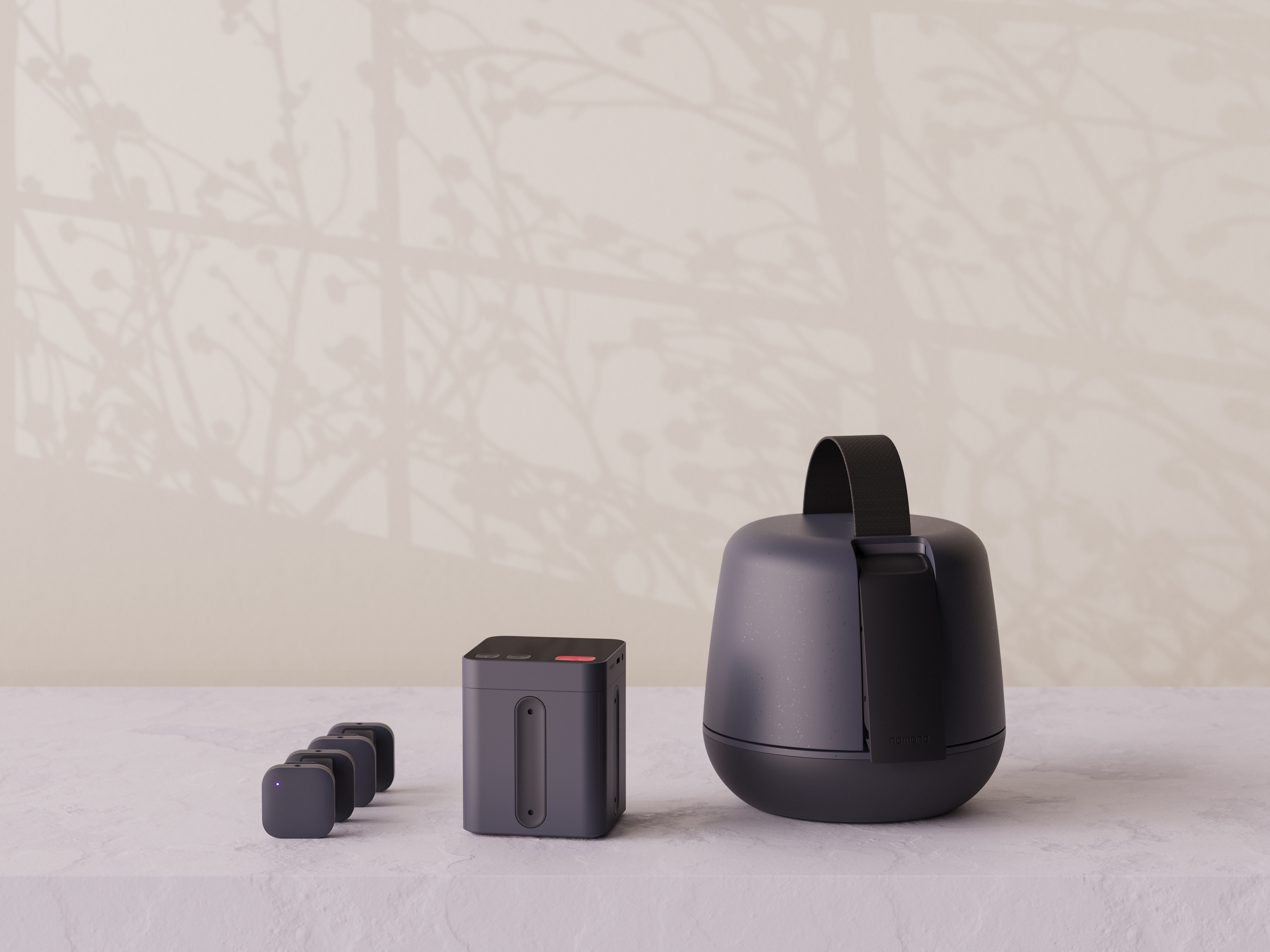Nomono calls its Sound Capsule a “portable, cloud-connected spatial audio field recorder for podcasters and broadcast journalists,” and with a $3,000 price tag, I’d also be using that many words to try to make sense of the product. The Norway-based team is launching its Sound Capsule today, alongside a cloud software suite that helps process and prep the captured audio for release.
“Well, you have your Zoom recorder, you have some random mics. There are cables, some are wireless, but nothing is connected — it’s not connected to your workflow,” said Jonas Rinde, CEO and co-founder at Nomono, in an interview, explaining the genesis of the idea for Nomono. “How can we replace the need for a studio with all these microphones, the setup time and the complexity. We want the technologies to disappear while you use them.”
Today, the company is showing off its integrated hardware and software solutions for simplifying field recording, file management, collaboration and production. The company is also paving the way for a future of more immersive spatial audio.
The Nomono platform comprises the Nomono Sound Capsule, which is a Wi-Fi enabled recorder that combines four compact wireless lavalier mics with a 360-degree spatial audio microphone array. The whole package weighs in at under 4 lb and connects to the Nomono Web App, an online audio collaboration tool where content creators can back up their recordings, collaborate with their production teams and apply AI-powered dialogue-enhancement processing to ensure their audio sounds the best it can before starting the editorial process.

The company is picking a fight with existing podcasting workflows, replacing a virtual and literal mess of cable and bits-n-bytes spaghetti with its all-in-one field recording solution. The company is targeting podcasters and journalists, and the tool automatically uploads recordings to a cloud-based audio collaboration and preparation tool.
The Nomono team claims to replace complexity with simplicity; the CEO told me that the company aims to replace a lot of audio engineering with a single Record button. There are no levels to set and no SD cards to format — the pitch is that creators just push one button and start the conversation.
The recorder itself includes an ambisonic microphone array to capture a high-resolution 3D recording of the environment and ambiance along with the voices of each participant. The combination makes it easy to record object-based spatial audio compatible with formats ranging from binaural all the way to Dolby Atmos. The goal is to pull listeners deeper into the conversation for a more immersive experience.
“All of Nomono’s technology is built with spatial audio in mind, so creators can produce content like they always have and make the transition to spatial audio production with ease,” Rinde explained to me.

If this was any other founding team, this article would include no small amount of ribbing for the company’s $3,000 price tag. It is a lot of money, and I’m struggling to appreciate who would elbow their way to the front of the line for this product. The only thing that’s giving me pause is the founders’ previous company. Before Nomono, Rinde headed up Huddly, which was very successfully selling $870 web cams for conference rooms. That’s also a preposterous price, but, having spent a bunch of time in Huddly-powered meeting rooms, the magic of high-quality, AI-enhanced video cameras was undeniable, and the product found itself an eager audience among people who wanted great meeting room experiences, price be damned. The team did it once for video conferencing, and who am I to say what tech and price tags the professional podcasting market will sustain.
The company’s demo video certainly paints a rosy picture of the future of podcasting, with a number of tricks up its sleeve that a peli case worth of recording gear can’t touch:
Audio captured by the Nomono Sound Capsule is uploaded wirelessly to the Nomono Web App, a secure cloud resource and audio collaboration tool featuring AI-powered signal processing that is remarkably good. It tidies up raw audio with great panache, and it’s easy to see how it could save time-crunched podcast producers a god-awful amount of time. In addition to the audio processing, the platform makes it easy for content creators to gather and organize material in a central repository. Producers can collect comments, feedback and approvals in an elegant timeline interface optimized for audio production. The company suggests that the same Nomono intelligent signal processing technology that enables spatial audio recordings can help separate the foreground dialogue from the background environment to provide much greater vocal clarity and noise reduction, with far less distracting artifacts or having to remove the background sound entirely.
“Nomono is redefining the listening experience by enabling anyone to record immersive audio with uncompromising quality and ease,” Rinde concluded. “With our platform’s ability to deliver excellent recordings at the push of a button, Nomono eliminates technical hurdles and time-consuming steps so podcasters and broadcast journalists can focus on their story and the people telling it.
Over time, it seems that the company wants to own the entire editing flow:
“Editing is on our roadmap. The first challenge was to automate the process of getting good audio,” explains Rinde. “The next features we implement will further ease the workflow for our users, and editing is on the roadmap; that’s a clear next step.
For now, all the AI functionality is happening in the cloud, but the company is planning to, over time, move more of the functionality to the device.
“Here is the clever thing with having the AI in the clouds at first: Right now, we do all the processing in the cloud with Amazon. That gives us a lot of power, and the key here is to train the AI in the cloud,” explains Rinde. “Next, you can make a little brother or sister of the AI that has been trained on a smaller data set. But it will be well trained, and you can put it on the hardware. We have a small piece of software that is already running on the sound capsule itself. Over time, we will try to move more down to the sound capsule itself because that will reduce the bandwidth needs.”
“For the hardware, we will have a price of $2,999 that you can pay upfront,” explains Rinde. “But then also we’ll do hardware as a service. Big media houses will just say ‘Yeah, we’ll have 10 of those.’ For an indie podcaster, they might want to move away from the Zoom recorder — for them, we can offer a month-to-month plan for $129 per month, and an annual plan at $119 per month, just to get kind of a low threshold to start using those for them.”
As an avid amateur podcaster, $3,000 is comprehensively outside my budget (I had to save up to buy my $120 microphone that I’m using now — but that also represents the entirety of my audio setup). The key thing is, this is not a product that is for me or people like me. The interesting piece is that professional audio producers have well-established workflows and are typically pretty persnickety about exactly how they like things set up. I’m eager to see who ends up adopting the Nomono setup.
We hope to come back with a review in the near future — but for now, if you’re feeling eager and early-adopter-y, you can join the product’s waitlist today.































Comment